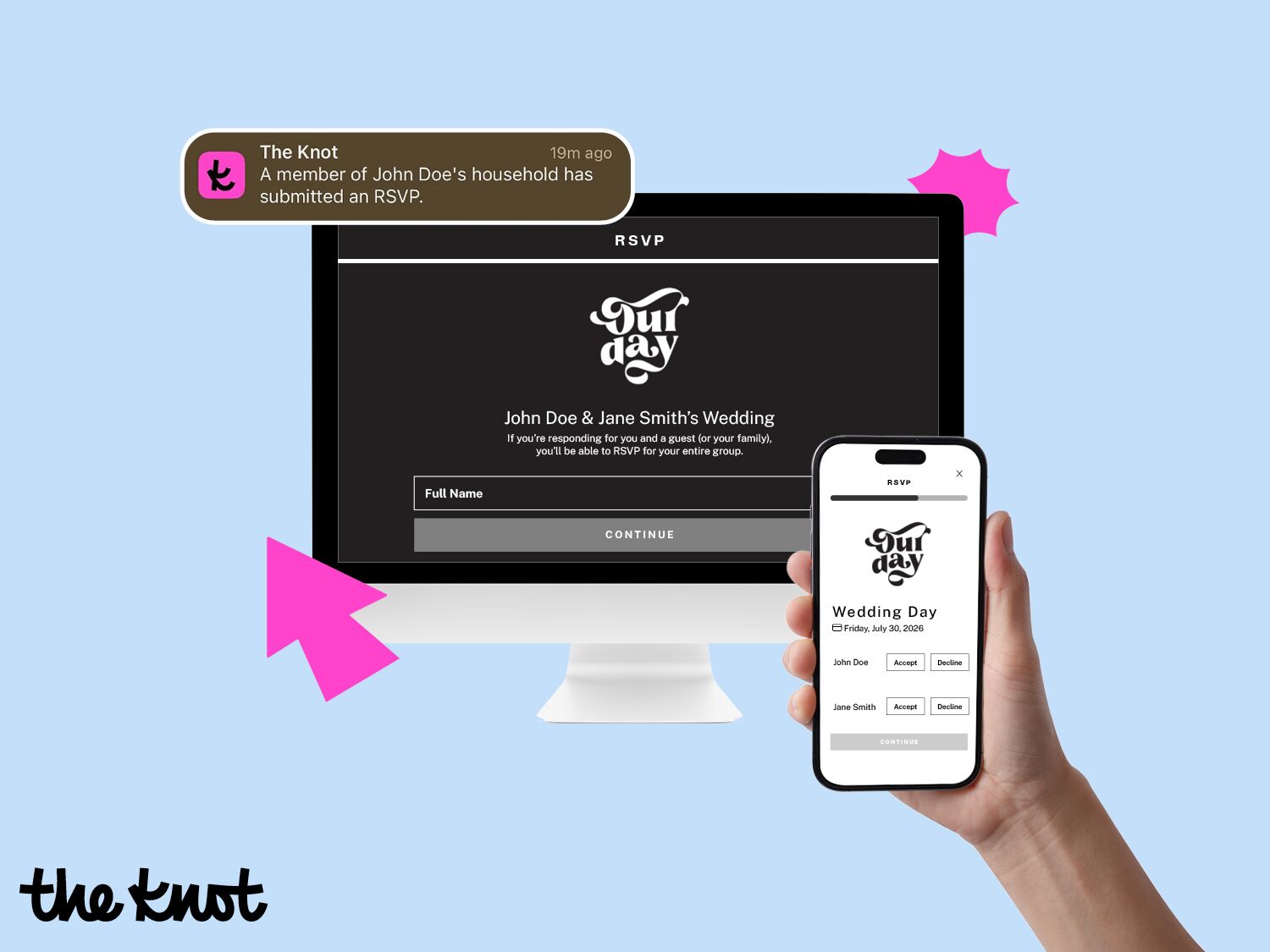How to Eliminate Wedding Planning Stress Once and for All

I get it, you landed on this story because it felt like a healthier alternative than huddling in a dark corner as your mind spins with questions like "is it normal for wedding planning to be stressful? How do I get rid of my wedding stress and anxiety?" As someone prone to anxiety, finding ways to reduce wedding stress is important to me as a wedding editor. That's why I connected with trusted wedding pros to get their expert advice on how to deal with wedding planning stress.
Below, Danielle Leilani, owner of Leilani Weddings in Los Angeles with over a decade of wedding experience, weighs in on how to plan a stress-free wedding. Plus, Rebecca Glayzer, a floral expert with seven-plus years of experience who is currently the senior merchandising manager of Poppy Flowers, shares wedding planning stress relief advice everyone can implement.
In this story:
- Is It Normal for Wedding Planning to Be Stressful?
- Most Stressful Parts of Wedding Planning
- How to Make Wedding Planning Less Stressful
- How to Handle Wedding Planning Stress: 11 Ideas
Is It Normal for Wedding Planning to Be Stressful?
Stress is the human body's response to pressure, which can often be brought on my major life changes and situations, such as a wedding. As such it is normal to experience some stress during wedding planning, especially as you make major decisions regarding your budget and vendors.
In limited capacities or short bursts, stress can lead to positive result—it can help you meet deadlines, avoid troubling circumstances and develop resilience. However, prolonged stress throughout the entire engagement can wear you down which is why it's important to prioritize relieving stress through trusted advice.
Most Stressful Parts of Wedding Planning
The four most stressful parts of wedding planning are making a budget, creating a guest list, settling on a date and booking a venue. The good news? You're not alone—everyone getting married has to complete those four wedding planning steps and there are tools to help you along the way.
How to Make Wedding Planning Less Stressful
No one expects engaged folks to be professional wedding planners. There's a reason trusted experts exist in every industry. Imagine how stressful it would be to be told you had to fix the plumbing in your home as a first-time home owner. Thankfully, there are professionals you can (and should) call. In much the same way, there are trusted wedding vendors that couples can (and should) book for a wedding, thousands of which can be found on The Knot Vendor Marketplace.
How to Handle Wedding Planning Stress: 11 Ideas
Practicially speaking, how do you de-stress from wedding planning? Follow these expert-backed tips to get rid of wedding stress once and for all. Of course, if the very idea of adding more tips or advice to your plate increases your stress, feel to free to take or leave the ideas that work best for you to handle wedding planning stress.
Hire a Wedding Planner
"How do I get rid of stress in my wedding planning?" One very simple way to answer that is to turn your wedding planning over to the professionals. When considering whether you should hire a wedding planner, bear in mind that you're investing in their help so that you don't have to worry about wedding minutiae that could induce stress. "Wedding planners are totally worth the expense," says Glayzer. The pro notes that even if you don't have the budget for a full-service planner, a partial wedding planner is still a smart addition to your vendor team.
Set Boundaries
"Everyone has an opinion on everything," explains Leilani. However, at the end of the day, this is your wedding to plan your way. The pro emphasizes to her clients that
"wedding plans need to be a little selfish—your wedding should be 80% of you and your partner's preferences, and 20% what you think your guests want or would like." Leilani encourages couples to be mindful when deciding who to involve in the overall planning process. Even so, you don't need to take all of the advice that those involved may offer. Glayzer (who's in the midst of planning her own wedding) is taking a thoughtful approach to vetting opinions from others. "Instead of adhering to traditions or family requests, we ask: does this reflect us? Viewing our wedding as a day that truly represents us makes planning enjoyable."
Rely on a Wedding Website
Setting boundaries is step one, but you also will need some support along the way to keep those boundaries and stand firm when opinions come your way. That's when a wedding website can help. Put key information, like details about plus ones, travel, gifts and more, on your wedding website. Then, instead of having to engage in numerous difficult conversations, you can politely direct loved ones to reference your wedding website.
Utilize Tools
In addition to hiring trusted wedding pros, there are tools that you can use during the planning process to simplify your life and de-stress the wedding journey. Lucky for you, all of the great planning tools The Knot offers can be accessed from The Knot App, so you have accessible help at your fingertips. From a budget builder to a guest list tracker and even a comprehensive checklist, The Knot App is a stress-relieving resource you can keep in your pocket.
Be Realistic
Does it feel like your wedding plans are starting to balloon out of control? "A lot of stress comes from biting off more than you can chew, financially speaking," explains Leilani. There's a reason setting your wedding budget should be one of the first decisions you make while planning your wedding—it will inform your approach to everything that follows. Making a wedding budget isn't a one-and-done activity, however. Sticking to the numbers you previously decided on at every step in the planning process will help you keep your wedding scope realistic and stress-free. "Being realistic with what you can actually afford and planning a wedding that represents that is imperative," adds Leilani.
Divide and Conquer
Wedding planning shouldn't fall all to one to-be-wed. Instead, divide tasks so that there is balance. For Glayzer, her fiancé is handling everything relating to the music while she is overseeing booking a wedding planning and selecting stationery. The division of tasks will look different from couple to couple, but sharing the load is key to keeping stress at bay. Plus, splitting responsibilities based on one another's strengths and interests will help minimize stress even further.
Prioritize Your Partner
Amid the hustle and bustle it can be easy to lose site of what's at the core of your wedding planning: your partner. "Remember that planning is supposed to be fun. It's important that couples remain connected throughout the journey, and consistently check in with one another to remind themselves of why they're doing this in the first place," advises Leilani.
Find ways to consciously keep one another's opinions, priorities and concerns top of mind throughout the process. Glayzer suggests couples implement a weekly "stand-up" meeting at the start of the week to do just that. In this 15-30 minute meeting, you can review "what needs to be done, what is going well, what might be off track, and things you're excited about. This simple ritual will help with communication and give you a container to connect at the same time. Bonus: this is a great habit to bring into your marriage."
Enjoy Date Nights
In addition to prioritizing your partner amid wedding planning, it's also important to invest in the non-wedding components of your relationship. Taking time away from wedding planning is critical to your success when it comes to how to de-stress from wedding planning. Glayzer says that "one effective strategy my fiancé and I use is dedicating a monthly date solely to wedding planning. This prevents being overwhelmed by daily tasks and allows us to enjoy our engagement, which flies by. Despite thinking about the planning daily, I remind myself to breathe and cherish this exciting time. It's crucial to let go of others' expectations and focus on our relationship."
Weave Stress-Relieving Activities Into Your Routine
Stress relief can look like special occasions, such as date nights, but it should also permeate the mundane, everyday parts of your life. Maybe you take five minutes every morning to practice breathing exercises. Or perhaps you take a walk around your neighborhood for 15 minutes every evening. No matter how small, having some consistent sources of stress relief that are part of your daily routine can bring a deep sense of calm.
Turn to the Pros, Both Wedding and Medical
Remember how we talked about the importance of professionals? Well, that extends beyond wedding pros. If it aligns with your goals, you could consider relying on wellness and medical professionals, from yoga teachers to therapists and beyond.
Prepare for Hiccups
Lastly, mentally preparing for at least a few things to go wrong will help those issues to roll off your back with ease when they do inevitably come along. "There are so many details associated with such a momentous day. While it makes sense to discuss and plan every detail, it may also be helpful to laugh and joke about the things that could go wrong and role play your response if they do," suggests Glayzer. "Surprises will happen along the way. Those surprises can turn out to be a fun story and experience if you choose to make them so."
Please note: The Knot and the materials and information it contains are not intended to, and do not constitute, medical advice and should not be used as such. You should always consult with a medical professional about your specific circumstances. This information contained herein is not necessarily exhaustive, complete, accurate or up to date and we undertake no responsibility to update. In addition, we do not take responsibility for information contained in any external links, over which we have no control.























